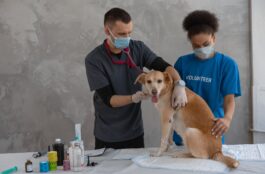
Did you know the secret to your pet’s surgical success could be hiding in their mouth? Good dental health in pets is not just essential for their overall well-being but directly affects the results of many surgical procedures, for a better understanding of this link and some effective ways to maintain your pet’s oral health, read on and delve into these must-know secrets.
Understanding dental disease in pets
Dental disease is prevalent among pets, with a staggering 90% of them experiencing some form of dental issue by the age of three. This condition may start out mild without causing obvious pain or infection. However, it can worsen over time and may lead to severe complications. Neglecting dental care can result in your pet experiencing conditions like gingivitis and periodontal disease, which are linked to an array of health issues.
The role of professional dental care in ensuring surgical success
Regular dental checkups and professional care by your dog dentist can go a long way in ensuring your pet’s health and surgical success. Veterinarians perform thorough dental cleanings on pets to eliminate plaque and tartar buildup, reducing the risk of oral infection. Treatment of existing conditions like gingivitis helps prevent systemic harm, which could complicate surgical procedures. Moreover, the extraction of diseased teeth by professionals can save your pet from pain, infection, and future complications.
Anesthesia in pet dentistry: A key component for thorough dental care
Contrary to what some pet owners may think, anesthesia is essential in pet dentistry. This helps in providing a comprehensive dental cleaning and ensures a stress-free, pain-free experience for your furry friend. Anesthesia enables your vet to perform dental procedures without any interruptions or stress for your pet while also allowing them to take dental X-rays for a better overview of their oral health.
At-home dental care’s contribution to overall pet health and surgical success
Partnering professional dental care with daily at-home practices can make a significant difference in your pet’s oral health. Invest in quality products like dental chews and treats, food and water additives, oral rinses, and wipes, as well as prescription dental diets that have been approved by the Veterinary Oral Health Council (VOHC). These products need to be incorporated into your pet’s daily routine to ensure their mouth remains healthy and disease-free, contributing to a higher likelihood of surgical success.
A visit to a trusted veterinary hospital
For maximum success in your pet’s dental health and surgical outcomes, a visit to a reputed veterinary hospital, such as River Oak Veterinary Hospital, can make all the difference. A clinic with an experienced staff and modern equipment will ensure the best possible care while keeping your pet comfortable throughout the entire process.
The impact of dental health on heart and kidney disease in pets
Poor dental health not only affects your pet’s teeth and gums but can lead to systemic issues, such as heart and kidney disease. Bacteria from the mouth can enter the bloodstream and attack vital organs, placing your pet at risk for more severe health problems that could affect any surgical outcomes. Tackling dental issues proactively is essential in preventing complications during surgery.
How to monitor and recognize signs of dental disease in your pet
It’s crucial to stay vigilant and look for signs of dental trouble in your pet. Some common signs include bad breath, red and inflamed gums, loose or missing teeth, and pawing at their face. By regularly checking your pet’s mouth and seeking timely treatment, dental issues can be managed effectively, leading to better overall health and successful surgery outcomes.
Timing dental care and surgery to maximize success
As a responsible pet owner, ensuring that dental care is scheduled appropriately can contribute to smoother surgical processes. Timely dental management can help prevent complications during or after surgery and improve healing rates. Regular veterinary checkups can help maintain your pet’s dental health, acting as a key contributor to their general well-being.
Conclusion
Maintaining your pet’s dental health is paramount not only for their overall well-being but also for ensuring optimal surgical outcomes. Combining professional care with at-home dental practices can make all the difference for your pet’s health and surgical success. So, keep a close eye on their smiles and keep those pearly whites sparkling clean.

